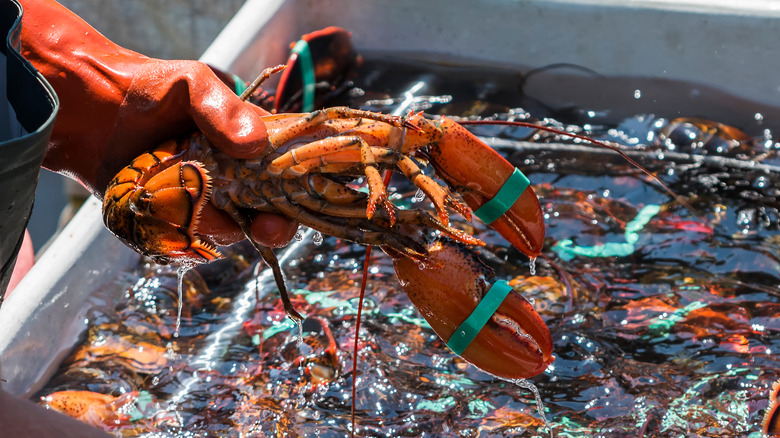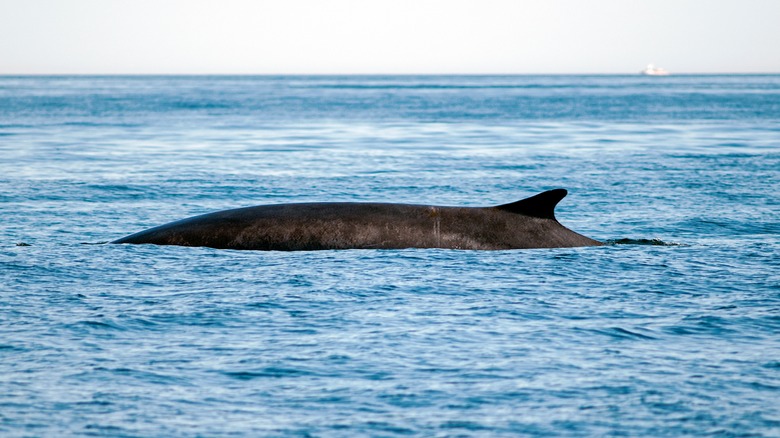Why Whole Foods Is Pausing Its Sale Of Maine Lobsters
If you're a fan of Maine lobsters, know that there will be fewer places you'll be able to find them, thanks to a decision by Whole Foods to put a pause on the sale of this popular crustacean. The decision, which takes effect on December 15, per The New York Times, wasn't made lightly. Whole Foods says it made its decision after recent changes in the species' sustainability ratings by two seafood watchdogs: the California-based Monterey Bay Aquarium Seafood Watch and the London-based Marine Stewardship Council. Seafood Watch gave the Maine lobster its worst possible rating — which called on diners to avoid the seafood, while the Marine Stewardship Council suspended its certificate of sustainability for lobsters caught in the Gulf of Maine.
The reason may not be what you think; another species is allegedly getting caught in the crossfire of lobster fishing. NOAA Fisheries, which oversees the nation's ocean resources, says that North Atlantic right whale populations have struggled since the 1890s when it was "hunted to the brink of extinction." Today, vessel strikes and gear entanglement are listed as top concerns for the species dwindling population.
More retailers may choose to stop selling Gulf of Maine lobsters
NOAA Fisheries did not point the finger at the lobster fishermen as a cause of the right whales' precarious state. But it did highlight two areas as being critical for the right whales: the mammal's foraging area off the coast of New England, which overlaps the Gulf of Maine, as well as areas off the coast of the southeastern United States. With fewer than 350 in existence today, the whale is listed as "endangered" and has been so since 1970.
Whole Foods may not be the only retailer in the country that will end up turning its back on Maine lobsters because, as The Washington Post points out, a certification by the Marine Stewardship Council is considered to be the gold standard when it comes to determining whether certain types of seafood are seen as "sustainable," and retailers use this certification as a way of displaying the environmental integrity of their seafood. This means that a particular seafood can be found in great numbers, the area it is caught in is well managed, and harvesting it doesn't harm other species.
Environment America Research & Policy Center's Virginia Carter called Whole Foods' decision an "important action to protect the highly endangered [whale]" and added that "With fewer than 340 North Atlantic right whales in existence, the species is swimming toward extinction unless things turn around," per The Guardian.
Whole Foods' decision has divided politicans, environmentalists
Perhaps unsurprisingly, the food retailer's decision isn't sitting too well with the Maine governor Janet Mills, the region's elected Congressional representatives, or the fishermen's association. In a joint statement, politicians and fishermen said they were "deeply frustrated" with Whole Foods' decision because it harms "the livelihoods of hardworking men and women up and down Maine's coast." They even pointed out that "There has never been a right whale death attributed to Maine lobster gear; Maine lobstermen have a 150-year history of sustainability; and Maine's lobstering community has consistently demonstrated their commitment to protecting right whales," per The Guardian.
In any case, Whole Foods' decision to stop selling Maine lobsters is not permanent — the chain has already said it was closely monitoring this situation and are committed to working with suppliers, fisheries, and environmental advocacy groups as it develops," per The New York Times. In the meantime, conservation groups are hoping lobster fishermen can find alternative ways to catch the popular crustacean, one that won't need ropes to be permanently left floating in the water, diminishing the chances of entanglement in the process. A pause might also help Maine lobsters, especially since its stocks were also declining, thanks to unsustainable fishing practices, at one point.


